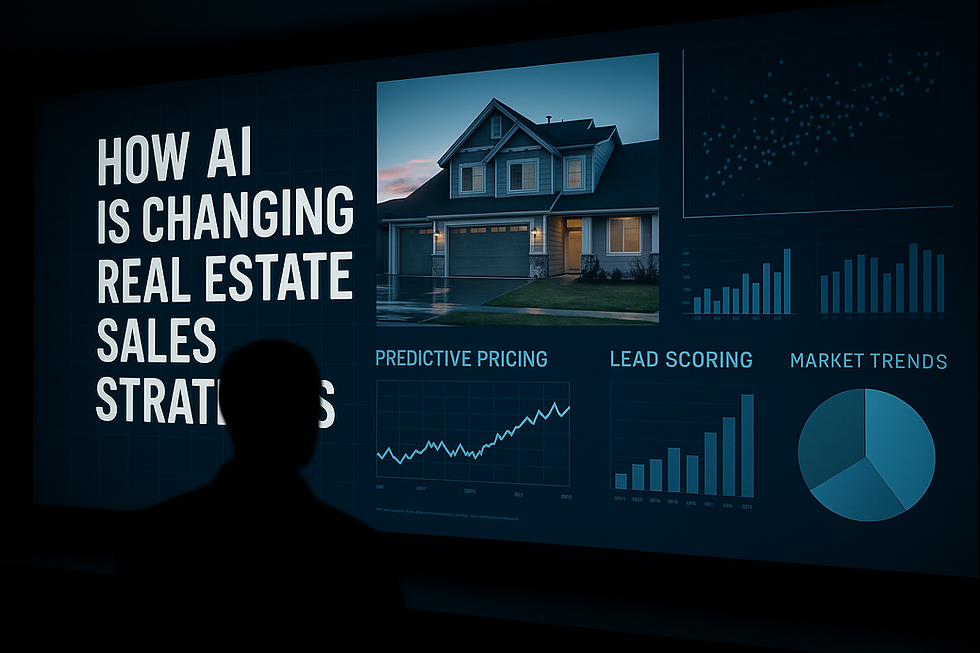AI Driven Sales in the Metaverse
- Muiz As-Siddeeqi

- Sep 21, 2025
- 5 min read

AI Driven Sales in the Metaverse
The Sale Didn’t Happen on a Website. It Happened in a Virtual Store in the Metaverse
No checkout cart. No mobile site. No “Buy Now” button.
Instead, a digital avatar—fully resembling the buyer—walked through a 3D showroom, tried on a virtual jacket using AR try-on tools, interacted with an AI-powered sales assistant who answered in real time, and then bought it using cryptocurrency.
That’s not fiction. That’s not the future.
That’s now.
Welcome to AI driven sales in the metaverse—a place where digital humans meet artificial intelligence to close real-world deals in immersive spaces.
And this is not hype. This is not fluff. It’s already generating billions.
Bonus: Machine Learning in Sales: The Ultimate Guide to Transforming Revenue with Real-Time Intelligence
This Blog is Not About What’s Coming. It’s About What’s Already Working.
Forget speculations. This is not another blog full of future predictions and tech dreams. This is about real, documented transformations in the way businesses sell products and services using AI inside the metaverse.
We’re diving deep into:
How AI is reshaping virtual shopping
Which real companies are using the metaverse to sell
What hard numbers say about sales impact
What AI tools power these environments
What success (and failure) in the metaverse actually looks like
And yes, all of this is backed with authentic reports, statistics, and real-world case studies—because we don’t deal in fantasy.
The Metaverse: From Hype to Sales Channel
In 2021, Mark Zuckerberg made waves by rebranding Facebook to Meta, putting $36 billion into building the metaverse by 2023 (Meta Investor Reports, 2023).
And while many mocked it, the idea of persistent, immersive virtual environments didn’t die. It evolved.
PwC predicts the metaverse could contribute over $1.5 trillion to the global economy by 2030.(Source: PwC, “Seeing Is Believing” Metaverse Report, 2022)
But here’s what matters for us: AI is becoming the backbone of how sales operate in these environments.
Where AI Meets the Metaverse in Sales
AI is not just part of the metaverse. It powers its very core—especially when it comes to selling. Let’s explore the building blocks.
1. AI-Powered Virtual Sales Assistants
In retail metaverse spaces, AI avatars are being trained with NLP (Natural Language Processing) to act just like human sales reps.
Example:
Forever 21 on Roblox launched a digital store where AI-driven avatars help users pick outfits. The AI suggests matching items based on past behavior and real-time interaction.
(Source: Business Insider, 2022, “Forever 21 Enters the Metaverse”)
2. Behavioral AI for Hyper-Personalization
Inside these immersive stores, AI tracks every movement: where the avatar lingers, what items are picked up, what was ignored. Then it uses machine learning models to personalize future experiences.
This is not hypothetical.
Emperia, a London-based startup, is doing this for brands like Ralph Lauren and Lacoste. Their AI monitors user navigation and tailors product placements dynamically.
(Source: Emperia.io Case Studies, 2023)
3. Predictive Analytics for Virtual Merchandising
With AI analyzing movement heatmaps and interaction data in real-time, brands are optimizing their virtual product placements.
In 2023, Nike’s Nikeland on Roblox reported over 7 million virtual visitors and used AI analytics to identify best-performing virtual products—some of which were later released physically due to high metaverse demand.
(Source: Nike Q4 FY2023 Earnings Report)
Real-World Companies Already Selling in the Metaverse (With AI)
Let’s now go beyond buzzwords and look at hard, documented examples of real companies using AI to boost sales inside the metaverse.
Case Study 1: Hyundai's AI Showroom in ZEPETO
In 2021, Hyundai Motor Company partnered with Naver Z’s ZEPETO to create a virtual showroom where customers could explore new car models.
The cars were embedded with AI-based interactive product descriptions, and Hyundai collected behavioral data using machine learning to improve physical showroom strategy.
Outcome:
Over 1.6 million visits within 2 months
70% of those who visited the metaverse showroom went on to browse real inventory online
(Source: Hyundai Press Release, ZEPETO Partnership, 2021)
Case Study 2: Samsung’s AI Sales Engine in Decentraland
In 2022, Samsung launched its 837X experience in Decentraland.
The AI component was critical: users could interact with a virtual concierge trained on real-world Samsung sales data. It handled product queries, demo walkthroughs, and redirected to purchase portals.
Within 1 month:
Over 120,000 unique user visits
14% click-through to real product pages
(Source: Samsung Newsroom, Jan 2022)
Case Study 3: Gucci Garden’s AI-Powered Commerce in Roblox
Gucci didn’t just enter Roblox for branding. It entered for real sales.
In the Gucci Garden experience, AI tracked avatar behavior and made personalized product suggestions—including rare virtual collectibles.
The result?
One virtual handbag sold for over $4,000—more than its real-world price.
AI-driven demand prediction helped Gucci plan real-world releases for items that performed well virtually.
(Source: The Verge, 2021; Roblox Corporation Reports)
Statistics You Cannot Ignore
Let’s ground this in pure numbers and facts—what is AI driven sales in the metaverse doing in the real world?
$120 billion was invested into metaverse-related infrastructure in 2022 alone (McKinsey, “Value Creation in the Metaverse”, 2022)
61% of U.S. consumers aged 13–35 say they’re interested in purchasing digital goods in the metaverse (Morning Consult, Metaverse Commerce Study, 2023)
AI-driven metaverse commerce is expected to generate over $200 billion in sales by 2030, globally (Bloomberg Intelligence, Metaverse Report, 2023)
Top 200 brands using AI in metaverse retail environments saw an average conversion lift of 18% compared to static 2D digital stores (Accenture Retail Insights, 2023)
AI Sales Use Cases Thriving in the Metaverse
Let’s get real. Here’s what’s actually being done with AI in metaverse sales channels:
Use Case | AI Technology Used | Example Company | Result |
Virtual Product Demos | NLP, 3D AI modeling | BMW | 100,000+ demo views per car in Joytopia |
Lead Qualification | Conversational AI | Samsung | 14% lead conversion from Decentraland |
Cross-Selling | AI product recommendations | Gucci | Sold out digital wearables |
Emotion Detection | Sentiment analysis AI | Lenovo (pilot) | Adapted product messaging live |
CRM Integration | AI avatars pulling real data | Salesforce (internal metaverse pilot) | Tracked sales triggers in real-time |
What Makes Metaverse + AI Sales Actually Work?
We studied real-world results. Here's what separates brands that win from those that flop:
True AI Personalization
Not basic chatbots. Real-time behavioral modeling + dynamic sales suggestions.
Data Integration
Bringing CRM, ERP, and sales data into virtual spaces for context-aware conversations.
Immersive Engagement with Purpose
Not just pretty showrooms, but environments built to convert—using AI to adapt, optimize, and persuade.
Experimentation with Metrics
Testing pricing, messaging, layout, even emotional responses, all with AI’s help.
Misconceptions That Need to Die
Let’s cut through the nonsense:
“The metaverse is dead”
Reality: Meta’s Reality Labs lost billions but global adoption continues to rise in retail, automotive, and entertainment sectors.
“It’s only for Gen Z gamers”
Reality: 42% of global metaverse retail users in 2023 were aged 30–49 (Statista, 2024)
“AI in metaverse is a gimmick”
Reality: It’s powering real lead capture, personalization, dynamic pricing, and sales conversations—at scale.
The Platforms Powering It All
Here are the real, documented platforms making AI-driven sales in the metaverse a reality today:
Unity with Unity ML Agents Toolkit
Microsoft Mesh + Azure AI
Meta’s Horizon Workrooms (with PyTorch models)
Roblox with path prediction ML APIs
Decentraland AI APIs for smart NPCs
NVIDIA Omniverse + Omniverse Avatar Cloud Engine (ACE)
These are being used not just in prototypes but in full-scale deployments across Fortune 500 brands.
Is It for Every Business? Not Yet. But Ignoring It is Risky.
Will every SMB need to launch a metaverse store with AI? Not today.
But the sales playbook is shifting faster than we think.
Those who treat the metaverse like a fringe experiment will be left behind—especially as more consumers expect interactivity, real-time assistance, and seamless, immersive buying journeys.
Just like mobile e-commerce was once “optional”…AI-driven metaverse sales will soon be a new normal.
Final Thoughts: We’re Already Inside the Future
This isn’t something we’re waiting on.
It’s already here. Already scaling. Already converting.
AI-driven sales in the metaverse are not futuristic. They’re operational.
They’re not theoretical. They’re revenue-generating.
They’re not a side project. They’re becoming the sales channel of tomorrow—today.
If your sales strategy doesn’t consider this space now, it risks becoming irrelevant tomorrow.

$50
Product Title
Product Details goes here with the simple product description and more information can be seen by clicking the see more button. Product Details goes here with the simple product description and more information can be seen by clicking the see more button

$50
Product Title
Product Details goes here with the simple product description and more information can be seen by clicking the see more button. Product Details goes here with the simple product description and more information can be seen by clicking the see more button.

$50
Product Title
Product Details goes here with the simple product description and more information can be seen by clicking the see more button. Product Details goes here with the simple product description and more information can be seen by clicking the see more button.






Comments